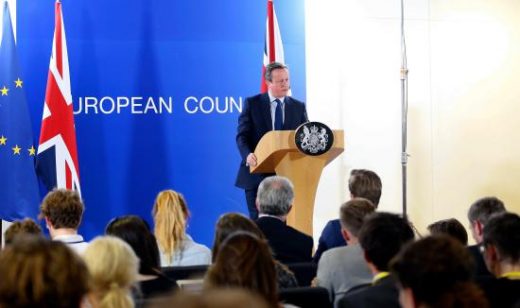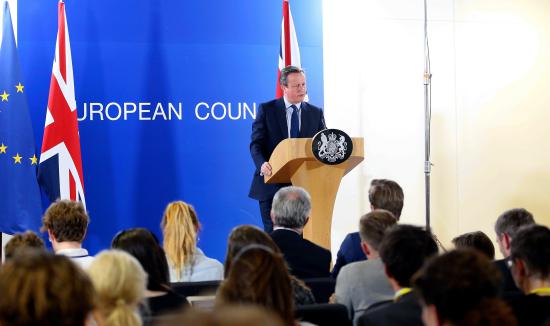The E.U. Begins the Long, Hard Process of Getting Britain Out
E.U. Leaders Warn Britain There Will Be No Favors in Brexit Negotiation

British Prime Minister David Cameron attended his final summit of European Union leaders on Tuesday in a Brussels gripped by regret and recrimination, but the two-day summit has yet to give any clarity on exactly how Britain will untangle itself from the bloc, or who will mediate the messy divorce.
Over a dinner of poached veal tenderloin with seasonal baby vegetables, Mr Cameron expressed his regret to the 27 other heads of government that Britain had not voted to remain in the E.U. in the June 23 referendum, and told them he wanted Britain to continue to have a close relationship with Brussels.
And while the other leaders may have expressed sadness and even a little sympathy for the outgoing Prime Minister as they polished off a dessert of fresh strawberries, they left him in little doubt that there would be no special treatment for the U.K.
French President François Hollande said Britain could not expect to simply select which aspects of its relationship with the E.U. it wanted to retain after leaving the bloc. “We cannot have the freedom of capital movement, the freedom of goods, the freedom of services and then say, ‘when it comes to people, stay put!’ Well no, it doesn’t work that way. It is the four freedoms or none,” Hollande said after the dinner.
Despite suggestions on Tuesday from U.S. Secretary of State John Kerry that there were a “number of ways” for the Brexit vote to be walked back, German Chancellor Angela Merkel made clear that the E.U. believed the result to be final and binding. “I see no way to reverse this. We all need to look at the reality of the situation.”
In Brussels at least, the fact of Britain’s departure from the E.U. was one of the few matters where there was unity and clarity. But no timetable was set out for when the U.K. might actually leave; the British government has yet to trigger Article 50, the vaguely-worded clause in the E.U. treaty which kick-starts two years of exit negotiations.
The President of the European Council, Donald Tusk, seemed willing to give the U.K. a pause before beginning the process. “Leaders understand that some time is now needed to allow the dust to settle in the U.K.” European Parliament leaders however want the formal request to leave as soon as possible to calm uncertainty in the markets; Cameron insists it is the job of his successor — who will likely not be in place until September — and he “can’t put a time frame” on when Article 50 would be invoked.
It also remains unclear who on the E.U. side will lead the exit negotiations, with Tusk increasingly asserting the authority of the Council — the grouping of the leaders of the E.U. member states — over the European Commission, the E.U,’s executive branch. Certainly some of the bitterest remarks of the night came from President of the Commission Jean-Claude Juncker, who explicitly blamed Cameron for creating the political atmosphere in Britain which led to the leave vote.
“My impression is that if you are over years, if not decades, telling your public that something is wrong with the European Union., that this European Union is too bureaucratic, too technocratic you cannot be taken by surprise if voters believe you,” he said.
Earlier, at a European Parliament session on the British referendum, he ordered diplomats at the Commission to refrain from any talks with the U.K. until Article 50 has been triggered, out of concern that Britain may try and get favorable terms in backroom negotiations.
The full rancour in Brussels was on display at that Parliament sitting, with many lawmakers taking aim at Cameron, the Conservative former Mayor of London and ‘Leave’ campaigner Boris Johnson, and Nigel Farage, leader of the anti-immigration U.K. Independence Party. Farage is also a member of the European Parliament, and gave a gloating speech to his fellow MEPs, who jeered one of their least-popular members.
“I’ll make one prediction this morning: The United Kingdom will not be the last member state to leave the European Union,” Farage said over the boos. In an interview with TIME, the leader of France’s far-right National Front Marine Le Pen echoed Farage’s remarks, saying the vote was the “beginning of the end” for the bloc.
Such concerns will on the table today as Cameron is excluded from the second day of the summit and the 27 other leaders meet to speak about future vision for the E.U. given the rise of euroskeptism. However, the bloc also remains divided over the best way to regain the trust of voters and prevent the E.U. splintering further.
Core nations like France, Belgium and Luxembourg believe the only way to save the E.U. is deeper political integration to bind the economies and foster financial stability. But fears of giving too much power to Brussels was one of the key issues of concern in the British vote, and many other leaders believe it would be a mistake to push further integration at this point.
Also today, the leader of the Scottish National Party, Nicola Sturgeon, will be in Brussels to discuss potential legal options for Scotland remaining in the E.U, as the majority of Scottish citizens voted ‘Remain’ in the referendum.
She can expect a warm welcome — with citizens in so many corners of the union turning away from the E.U., officials in Brussels can ill afford to ignore the few who still share their vision of a united continent, albeit one now shorn of one its most valued members.
(22)



